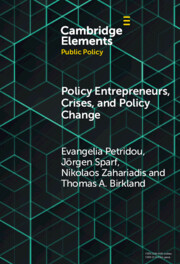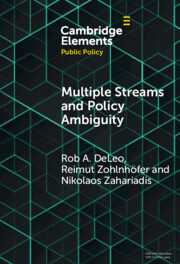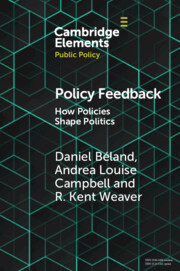Refine search
Actions for selected content:
72 results
9 - Conclusion: It Is Not Too Late
-
- Book:
- From Crisis to Action
- Published online:
- 15 August 2025
- Print publication:
- 04 September 2025, pp 208-220
-
- Chapter
-
- You have access
- Open access
- HTML
- Export citation

From Manners to Rules
- Advocating for Legalism in South Korea and Japan
-
- Published online:
- 29 August 2025
- Print publication:
- 07 August 2025
Pension reforms, economic security, and mental health: The need for a human rights-based approach
-
- Journal:
- Cambridge Prisms: Global Mental Health / Volume 12 / 2025
- Published online by Cambridge University Press:
- 01 August 2025, e91
-
- Article
-
- You have access
- Open access
- HTML
- Export citation
Without enabling reuse, the Treaty risks locking in disposability
- Part of
-
- Journal:
- Cambridge Prisms: Plastics / Volume 3 / 2025
- Published online by Cambridge University Press:
- 20 June 2025, e15
-
- Article
-
- You have access
- Open access
- HTML
- Export citation
Precedent, Progress, and Missed Opportunities: Conflict and Debates over Legislating Climate Change Emissions Reductions in Japan
-
- Journal:
- Asia-Pacific Journal / Volume 21 / Issue 9 / September 2023
- Published online by Cambridge University Press:
- 14 March 2025, e1
-
- Article
-
- You have access
- Open access
- Export citation

Policy Entrepreneurs, Crises, and Policy Change
-
- Published online:
- 10 December 2024
- Print publication:
- 16 January 2025
-
- Element
-
- You have access
- Open access
- HTML
- Export citation
Emergency Responses to COVID-19 and Opportunities for Inclusive Social Policy
-
- Journal:
- Journal of Social Policy , First View
- Published online by Cambridge University Press:
- 07 November 2024, pp. 1-17
-
- Article
-
- You have access
- Open access
- HTML
- Export citation
The Way She Moves: Political Repositioning and Gender Stereotypes
-
- Journal:
- Journal of Experimental Political Science / Volume 12 / Issue 1 / Spring 2025
- Published online by Cambridge University Press:
- 25 April 2024, pp. 72-85
-
- Article
-
- You have access
- Open access
- HTML
- Export citation

Multiple Streams and Policy Ambiguity
-
- Published online:
- 28 February 2024
- Print publication:
- 21 March 2024
-
- Element
- Export citation
What Can State Medical Boards Do to Effectively Address Serious Ethical Violations?
-
- Journal:
- Journal of Law, Medicine & Ethics / Volume 51 / Issue 4 / Winter 2023
- Published online by Cambridge University Press:
- 13 March 2024, pp. 941-953
- Print publication:
- Winter 2023
-
- Article
-
- You have access
- Open access
- HTML
- Export citation
Critical junctures as complex processes: examining mechanisms of policy change and path dependence in the Canadian pandemic response to homelessness
-
- Journal:
- Journal of Public Policy / Volume 43 / Issue 3 / September 2023
- Published online by Cambridge University Press:
- 24 April 2023, pp. 447-467
-
- Article
-
- You have access
- Open access
- HTML
- Export citation
Ideas and Policy Response to the COVID-19 Crisis: Evidence from Jakarta, Indonesia
-
- Journal:
- Social Policy and Society / Volume 23 / Issue 4 / October 2024
- Published online by Cambridge University Press:
- 09 December 2022, pp. 805-824
- Print publication:
- October 2024
-
- Article
-
- You have access
- Open access
- HTML
- Export citation
3 - The State and Primary Education in India
- from Part I - Introduction, Puzzles and Theory
-
- Book:
- Making Bureaucracy Work
- Published online:
- 18 November 2022
- Print publication:
- 01 December 2022, pp 86-116
-
- Chapter
- Export citation
From anticipatory strategies to reactive blame games in multi-level settings: the role of structure and politics in stability and policy change
-
- Journal:
- Journal of Public Policy / Volume 42 / Issue 4 / December 2022
- Published online by Cambridge University Press:
- 27 September 2022, pp. 802-826
-
- Article
-
- You have access
- Open access
- HTML
- Export citation

Policy Feedback
- How Policies Shape Politics
-
- Published online:
- 06 June 2022
- Print publication:
- 23 June 2022
-
- Element
-
- You have access
- Open access
- HTML
- Export citation
Institutions in the politics of policy change: who can play, how they play in multiple streams
-
- Journal:
- Journal of Public Policy / Volume 42 / Issue 3 / September 2022
- Published online by Cambridge University Press:
- 17 March 2022, pp. 509-528
-
- Article
-
- You have access
- Open access
- HTML
- Export citation
Policy Legacies, Sociopolitical Coalitions, and the Limits of the Right Turn in Latin America: The Argentine Case in Comparative Perspective
-
- Journal:
- Latin American Politics and Society / Volume 64 / Issue 1 / February 2022
- Published online by Cambridge University Press:
- 07 February 2022, pp. 47-71
-
- Article
- Export citation
Bringing Back the State: Understanding Varieties of Pension Re-reforms in Latin America
-
- Journal:
- Latin American Politics and Society / Volume 63 / Issue 4 / November 2021
- Published online by Cambridge University Press:
- 21 December 2021, pp. 22-44
-
- Article
-
- You have access
- Open access
- HTML
- Export citation
5 - Worldviews, Risk Perceptions, and Causal Beliefs
- from Part III - Individual Beliefs
-
- Book:
- Community Disaster Recovery
- Published online:
- 08 October 2021
- Print publication:
- 21 October 2021, pp 87-99
-
- Chapter
- Export citation
2 - Colorado’s 2013 Floods
- from Part I - Introduction
-
- Book:
- Community Disaster Recovery
- Published online:
- 08 October 2021
- Print publication:
- 21 October 2021, pp 27-46
-
- Chapter
- Export citation
